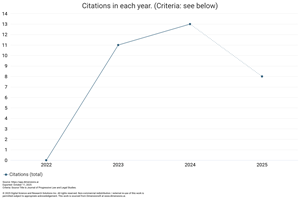Decentralization and Strengthening of Districts in Papua: Analysis in the Perspective of Constitutional Law
DOI:
https://doi.org/10.59653/jplls.v3i01.1493Keywords:
Decentralization, Strengthening Districts in Papua, Constitutional Law PerspectiveAbstract
This study aims to analyze the weaknesses of district authority in implementing Papua Special Autonomy and its impact on the implementation of government and public services and examine the obstacles in implementing decentralization in Papua, especially related to the position and authority of the district. The research method used in this study is the normative legal research method using a statutory, conceptual, and comparative approach. The results of this study reveal that district authority in implementing the Papua Special Autonomy policy has a crucial role in bringing public services closer to the community and increasing the effectiveness of local government administration. Based on Law Number 2 of 2021 and its derivative regulations (PP Number 106 of 2021 and PP Number 107 of 2021), districts have a strategic role in development planning, regional financial management, and local wisdom-based governance. Meanwhile, the obstacles in implementing Special Autonomy at the district level in Papua reflect broader challenges in the decentralization system and regional governance. Based on an analysis of Law Number 2 of 2021, PP Number 106 of 2021, and PP Number 107 of 2021, the main obstacles faced in the implementation of Special Autonomy in the district include: limited capacity of district officials, less than optimal financial management, weak coordination between institutions, and low community participation in the governance process.
Downloads
References
Badan Pusat Statistik Papua. (2023). Statistik Kesejahteraan Rakyat Papua 2023. Badan Pusat Statistik Provinsi Papua.
Cahyaningsih, A., & Fitrady, A. (2019). The impact of asymmetric fiscal decentralization on education and health outcomes: Evidence from Papua Province, Indonesia. Economics and Sociology, 12(2). https://doi.org/10.14254/2071-789X.2019/12-2/3
Dicey A.V. (1885). Introduction to the Study of the Law of the Constitution. Penerbit: Macmillan & Co.
Friedrich, Carl. J. Public Policy: A Yearbook of the Graduate School of Public Administration, Harvard University (1940). Editor: Carl J. Friedrich dan Edward P. Mason Penerbit: Harvard University Press.
Freire, Paulo. (2000). Pendidikan Kaum Tertindas. Terjemahan oleh Agung Prihantoro. Jakarta: LP3ES.
Edwards III, George C. (1980). Implementing Public Policy. Penerbit: Congressional Quarterly Press.
G. Shabbir Cheema & Dennis A. Rondinelli. (1983). Decentralization and Development: Policy Implementation in Developing Countries. Penerbit: Sage Publications, Beverly Hills.
Ismail, I., & Rusfiana, Y. (2020). Asymmetrical Decentralization and Equitable Development in Papua. MIMBAR : Jurnal Sosial Dan Pembangunan, 36(1). https://doi.org/10.29313/mimbar.v36i1.5484
Lele, G. (2019). Asymmetric Decentralization and the Problem of Governance: The Case of Indonesia. Asian Politics and Policy, 11(4). https://doi.org/10.1111/aspp.12493
Lele, G. (2023). Asymmetric decentralization, accommodation and separatist conflict: lessons from Aceh and Papua, Indonesia. Territory, Politics, Governance, 11(5). https://doi.org/10.1080/21622671.2021.1875036
LIPI. (2020). Evaluasi Implementasi Otonomi Khusus Papua. Lembaga Ilmu Pengetahuan Indonesia.
Lubis, A. F. (2025). Harmonization of Derivative Legislative Products Post-Constitutional Court Decision. Journal of Progressive Law and Legal Studies, 3(01 SE-Articles), 32–40. https://doi.org/10.59653/jplls.v3i01.1310
Montesquieu (1748). De l'Esprit des Lois (The Spirit of the Laws). Penerbit: Barrillot & Fils di Jenewa.
Oates, Wallace E. (1993). Fiscal Decentralization and Economic Development. National Tax Journal, 46(2), 237-243.
Peraturan Pemerintah Nomor 106 Tahun 2021 tentang Kewenangan dan Kelembagaan Pelaksanaan Kebijakan Otonomi Khusus Papua.
Peraturan Pemerintah Nomor 107 Tahun 2021 tentang Penerimaan, Pengelolaan, Pengawasan, dan Rencana Induk Percepatan Pembangunan dalam Rangka Pelaksanaan Otonomi Khusus Papua.
Rondinelli, D. A. (1981). Government Decentralization in Comparative Perspective: Theory and Practice in Developing Countries. International Review of Administrative Sciences, 47, 133-145. DOI: 10.1177/002085238004700205
Smith, B.C. (1985). Decentralization: The Territorial Dimension of the State. London: Allen and Unwin.
Sopaheluwakan, W. R. I., Fatem, S. M., Kutanegara, P. M., & Maryudi, A. (2023). Two-decade decentralization and recognition of customary forest rights: Cases from special autonomy policy in West Papua, Indonesia. Forest Policy and Economics, 151. https://doi.org/10.1016/j.forpol.2023.102951
Sujono, I. (2022). Urgensi Penemuan Hukum dan Penggunaan Yurisprudensi dalam Kewenangan Mahkamah Konstitusi. Jurnal Konstitusi, 18(3), 585. https://doi.org/10.31078/jk1835
Sujono, I., & Nugroho, M. (2023). Omnibus Law as Investment Law Reform in Indonesia Based on the Hierarchy of Legislation Principles. Journal of Progressive Law and Legal Studies, 1(02 SE-Articles), 47–65. https://doi.org/10.59653/jplls.v1i02.28
Undang-Undang Nomor 2 Tahun 2021 tentang Perubahan Kedua atas Undang-Undang Nomor 21 Tahun 2001 tentang Otonomi Khusus Bagi Provinsi Papua.
Van Meter, D. S., & Van Horn, C. E. (1975). The Policy Implementation Process: A Conceptual Framework. Administration & Society, 6(4), 445-488.
World Bank (1992). Governance and Development. Penerbit: The World Bank.
Zimmerman, M. A. (1995). Psychological empowerment: Issues and illustrations. American Journal of Community Psychology, 23(5), 581-599.
Downloads
Published
How to Cite
Issue
Section
License
Copyright (c) 2025 Lily Bauw

This work is licensed under a Creative Commons Attribution-ShareAlike 4.0 International License.
Authors who publish with this journal agree to the following terms:
- Authors retain copyright and grant the journal right of first publication with the work simultaneously licensed under a Creative Commons Attribution-ShareAlike that allows others to share the work with an acknowledgement of the work's authorship and initial publication in this journal.
- Authors are able to enter into separate, additional contractual arrangements for the non-exclusive distribution of the journal's published version of the work (e.g., post it to an institutional repository or publish it in a book), with an acknowledgement of its initial publication in this journal.
- Authors are permitted and encouraged to post their work online (e.g., in institutional repositories or on their website) prior to and during the submission process, as it can lead to productive exchanges, as well as earlier and greater citation of published work (See The Effect of Open Access).
























